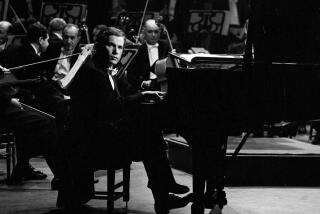Superstar Lenny: Too Much Talent, Too Little Time
- Share via
Leonard Bernstein, who died Sunday at the age of 72, endured a curse--he was too talented.
He was a superstar conductor, the first American to fill that glamorous bill.
He was known for his agitated--some called it hysterical--podium manner, much applauded for his probing interpretations of a vast symphonic repertory.
He appealed to the masses from the outset of his long, multifaceted career, and he eventually won over most cognoscenti as well.
He was handsome, bold, flashy, passionate, even thoughtful. He had that strange quality the publicists label charisma.
He had virtually everything.
He functioned as a great popularizer of potentially unpopular music.
His was a household name.
Conducting was just one of his specialties. He could have left his mark on the century as a pianist, a composer or a teacher. He was so intelligent, so facile.
His varied professional pursuits did not always turn out to be mutually complementary. The days were always too short. So, some observers thought, was his attention span.
He always complained that he didn’t have enough time. He desperately wanted to write the great American opera, but was too busy conducting. He wanted to be more active in the opera-house pit, but had too many commitments in the concert hall. He might have liked to hone his skills at the keyboard, but he had that commission for a musical comedy in his desk drawer. He could have written philosophical books to complement his historical lectures, but the clock, and the calendar, were his constant enemies.
He never could make up his mind which challenge came second in his life, much less which came first.
It is astonishing that he accomplished so much in spite of himself.
Frail health forced him to announce just last Tuesday that he was giving up conducting. Most people who knew Lenny--few called him Mr. Bernstein--found that hard to believe.
Energy was his leitmotif , his password.
On the podium, he couldn’t just beat time, give entrance cues and emotive clues. He had to leap and gesticulate and bounce and dance as if possessed by musical demons; as if lives were at stake. His admirers regarded this as a compelling advantage. His detractors thought it might just be affectation.
Even his detractors--their number decreased dramatically with the passing decades--agreed that Bernstein was something of a genius. They deplored his penchant for excess. Understatement was never his forte. At the same time, they applauded his hypnotic zeal, his melodic flair, his uncanny sense of sonic architecture, his sensitivity to rhythmic definition and textural nuance.
Bernstein opened doors. He proved that distinguished music directors need not speak with foreign accents.
He served as a missionary for the output of Gustav Mahler, a composer-conductor with whom he happened to share numerous personal and professional affinities.
He championed an authentic American tradition. He chipped away at the conventional barriers separating symphonic music and jazz, Carnegie Hall and Broadway, classical elegance and show-biz pizazz.
He wasn’t afraid to take public stands on unpopular political issues, even when the liberal causes he favored were not chic. He remained a social progressive, even though he became an aesthetic conservative.
An unabashed sentimentalist, he carried on a life-long flirtation with maudlin emotions. His concerts usually ended as love fests in which the ecstatic, perspiring maestro hugged and kissed every man, woman and child within reach on the stage.
Essentially, Bernstein was a romantic misplaced in a hectic modern age. He demonstrated little sympathy for the experiments of the avant-garde. Although he wanted to write music worthy of comparison with his beloved Mahler, he suffered from a time warp that made his most serious compositions sound merely pretentious or banal.
Ironically, he had few equals when he confronted more earthy commercial challenges. He did not seem to want to be remembered, however, as the man who wrote the catchy and clever tunes of “Candide.” He was haunted, for better or worse, by the funky bravado of “West Side Story.”
He always insisted that he had loftier goals. We will never know if he could have realized them.
He thrived on controversy. He did not invariably play by the rules. He loved to conduct--and explain--music for audiences of school children, and never condescended to them. He commanded an irrepressible theatrical flair, bolstered by a healthy ego. He liked to flaunt what he had.
For all his vast popular success, he sometimes showed signs of insecurity. He wasn’t above employing ridicule as a rehearsal technique. He occasionally attacked his critics--this one included--when he felt they failed to fully appreciate his art. He wanted everyone to love him.
Nearly everyone did. Even those who didn’t will miss him. He leaves a painful gap in American music.
More to Read
The biggest entertainment stories
Get our big stories about Hollywood, film, television, music, arts, culture and more right in your inbox as soon as they publish.
You may occasionally receive promotional content from the Los Angeles Times.










